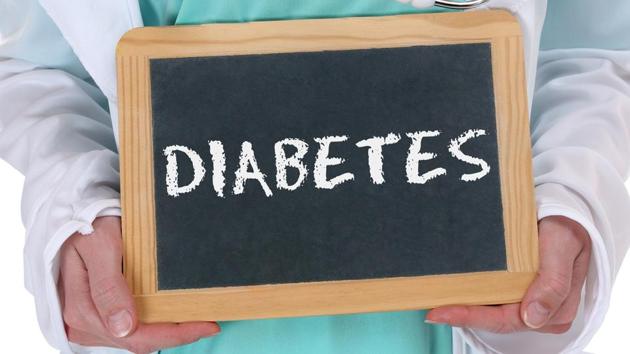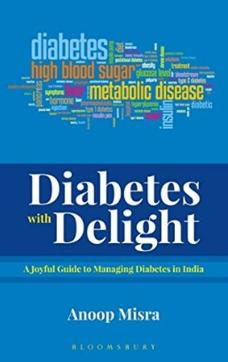Book excerpt: Dieting tips for diabetics and 10 weight-loss myths busted
Diabetes with Delight is a comprehensive guide to managing diabetes, which covers a wide range of topics from the ideal diet to travelling tips for diabetics. In this excerpt, Dr Anoop Misra lists weight control and dieting tips for diabetics and clears commonly believed myths about weight loss.
Weight Control & Dieting Tips:

• Stock your kitchen with healthy foods, avoid stocking up on calorie rich and sugary foods like milk chocolates, butter, cookies, red meat, full-cream milk and hydrogenated and saturated fat-laden oils (e.g. Vanaspati, Dalda, ghee, coconut oil) for cooking, etc
• Do not skip meals and avoid dieting (skipping a meal and then binge eating at the next meal). This will make you pile on the kilos in the long run
• Observe regular meal times;
• Chew your food slowly, take plenty of water;
• Take foods rich in fibre, e.g. fruits and vegetables;
• Eat colourful fruits and vegetables: preferably a combination of red, green, orange and yellow. Plenty of green salads and green leafy vegetables;
• Increase protein (see previous section in same chapter for protein) in diet (make sure kidney dysfunction is not present)
• Avoid processed foods and go for fresh food;
• Try to eat meat only once a week, preferably fish and chicken;
• Have a balanced breakfast. Do not skip it;
• Include a variety of nuts (pistachios, almonds, walnuts) in your diet; use cinnamon (dalchini ) daily.
• Opt for green tea. Avoid cold drinks, aerated drinks and juices;
• Replace full-cream milk with skimmed milk. Similarly, low-fat cheese and low-fat yoghurt is preferable over full-fat cheese and curd;
• Go for a meal pattern that includes three meals and three snacks. It has been seen that small, healthy snacks between meals actually help in shedding weight, rather than long gaps in between meals;
• Fill yourself up with salad and a bowl of vegetable soup before a meal, especially if you are going out. This way, you will tend to eat lighter;
• Avoid second helpings;
• Go easy on the salt;
• Go for rotation of oils like canola, olive and mustard.A little fat is needed in your food, so do not banish saturated fats totally from your diet;

• Opt for healthier cooking methods like steaming, grilling, roasting, baking, broiling, etc. For example, eggs could be boiled or poached instead of fried or scrambled;
Weight Loss Myths
There are innumerable myths about diet and similar number of diet plans and ‘bestselling books’. Most will endorse personalised diet plans, and most of these diet plans are untenable in the long run and are often irrational/non-scientific.
Myth: Snacking is always a bad idea.
Fact: Having snacks in between meals might actually help you eat less, and stave off the urge to overeat or binge later. Try having healthy snacks; moderate amounts of fruits, vegetables, salads, nuts etc.
Myth: No more fast food.
Fact: Fast foods have high saturated fat, trans fats and salt. Occasionally fast food could be taken:
• Get a salad as a starter;
• Choose the grilled chicken over fried, breaded chicken.
• Don’t take colas and sugar-sweetened beverages as accompanying drinks;
• If it is made-to-order, tell them to put less oil or butter.
Myth: All carbs are bad.
Fact: One should avoid simple, processed carbs like cookies, cakes, muffins, cold drinks which are often high in sugar and white flour. Instead, go for complex carbs like beans, whole grains (brown rice and whole-grain breads), and don’t forget fruits and vegetables.
Myth: Certain foods make you burn calories.
Fact: You will find such information often on popular websites or those who prescribe fad diets. There are no foods that increases metabolic rate or help burn calories. Intake of some fruits like berries, however, may result in less weight gain over time. High-protein diets may also accelerate weight loss. Recently, our research showed that use of cinnamon can promote weight loss also.
Myth: If you eat and exercise properly and consistently, you will never gain weight.
Fact: You should make lifestyle changes and dietary adjustments, as with increasing age your metabolism slows down. The biggest change usually occurs between the age of forty and fifty years, and in particular in post-menopausal age in women, when there are chances of rapid weight gain.
Myth: Slimming pills are effective for long-term weight loss.
Fact: No. Slimming pills alone will not help you keep the weight off in the long-term. Further, mostly these pills produce results when a person is doing adequate amount of diet and exercise.
Myth: Foods/oils labeled ‘low fat’/‘reduced fat’/‘zero cholesterol’ are always healthy choices.
Fact: Be cautious. These labels are often misleading. A reduced-fat snack should contain less fat than the full-fat version, but that doesn’t automatically make it a healthy choice. It could still contain a lot more fat than a portion of fruit. Low-fat foods also contain high levels of sugar. Similarly so called ‘zero cholesterol’ oils contain other harmful fatty acids. One should take these advertisements with a pinch of salt.
Myth: Drinking water helps you lose weight.
Fact: Water does not help you to lose weight, but it does keep you hydrated, and might help you snack less. Water is essential for good health and well-being. Sometimes thirst can be mistaken for hunger; if you’re thirsty you may snack more. Drink 1.5–2 litres (8–10 glasses) of fluids a day.
Myth: Skipping meals/fasting is a good way to lose weight.
Fact: Skipping meals is never a good idea. To lose weight and keep it off, you have to reduce the amount of calories you consume, or increase the calories you burn through exercise. Skipping meals/fasts result in tiredness, poor nutrition and increase possibility for hypoglycaemia in patients with diabetes on drugs and insulin. After missing a meal, highfat and high-sugar food intake as compensatory foods will likely result in weight gain!
Myth: The reason why I weigh more is because my thyroid isn’t working well.
Fact: It’s true that weight gain will occur in someone who has advanced hypothyroidism (low thyroid hormone levels). In any obese person or in those with increasing weight, levels of thyroid hormone should be checked. If level of thyroid stimulating hormone (TSH) is normal, weight gain should not be attributed to thyroid dysfunction.
Excerpted with permission from Diabetes with Delight: A Joyful Guide to Managing Diabetes in India by Anoop Misra, Bloomsbury India, 2018.
Do you have any queries regarding diabetes management? Tweet your questions @htlifeandstyle and we’ll get them answered by Dr Anoop Misra.



